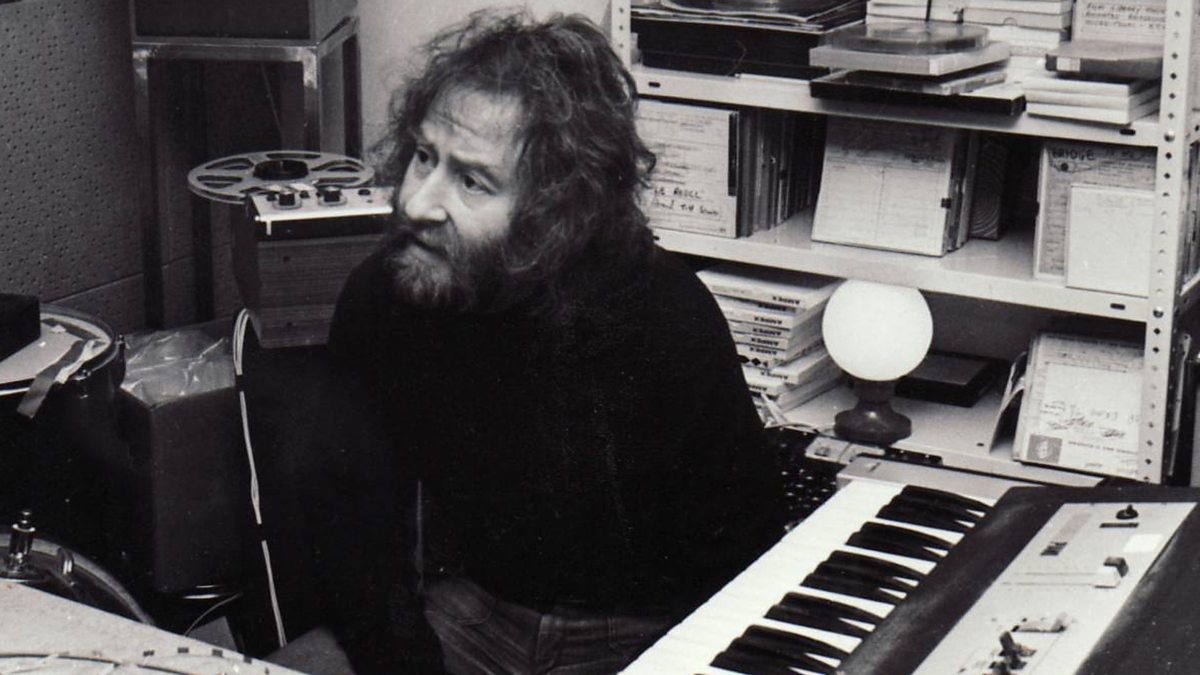Basil Kirchin was an English composer and drummer. He lived from 8 August 1927 to 18 June 2005. His career included playing drums with his father’s big band when he was 13, scoring films, and electronic music that uses tape manipulation to create sounds for birds, animals and autistic kids. Basil Philip Kirchinsky was born in Blackpool, Lancashire, to Lilian Kay Kirchin and Ivor Kirchin (Isaac Kirchinsky). At the age of 13, he made his debut playing drums in his father’s orchestra at Tottenham Court Road, London. He left his father’s group to join Ted Heath’s bands Harry Roy, Teddy Foster and Jack Nathan after the war. However, he returned to his father’s job in 1951. George Martin produced the early recordings of The Kirchin Band for Parlophone. Basil could record live performances from the soundboard while on the road with The Kirchin Band. The rise of Skiffle and Rock and Roll in 1957 had ended the Big Band era. Kirchin felt it was time for him to leave the band “because you’re still a prisoner to rhythm”. Kirchin spent five months at the Ramakrishna Temple in India a decade before it was fashionable. After moving to Sydney with Theresa in October 1959, a strap snapped and all his possessions, including recordings from the Kirchin band, were lost below the water. He would be troubled for the rest his life by this loss. Kirchin returned to Britain in 1961. Basil split his time between London, Hull and the Mecca Locarno club in Hull. His father Ivor had secured a residency there. He met Keith Herd, a Hull musician, and began to work on experimental pieces. He lived in London with Pat Ryan and Jimmy Jaques, and made significant contributions to the Johnny Keating album, ‘The Keating Sound. He used the talents of young session musicians like Jimmy Page, Big Jim Sullivan and Tubby Hayes to produce material for the De Wolfe Library. He was awarded a grant by the Arts Council in 1967 to buy a Nagra tape recorder. He used this to record ambient sounds, animal sounds at London Zoo, and voices of autistic kids. Kirchin tried slowing down recordings to make “Little Boulders of sound.” Take birdsong. All the harmonics that you don’t hear are reduced – sounds human ears have never heard before. Partly to finance his experiments, he composed film music for Catch Us If You Could (1965), The Shuttered Room (67), The Strange Affair (68), I Start Counting (1969), and The Abominable Doctor Phibes (1971). Two albums featuring his experimental music were issued by World Within Worlds. The first album, Worlds Within Worlds (EMI Columbia SCX6463), was released in 1971. It included Parts I – Integration 2 and Part II – The Human Element. The second, Worlds Within Worlds Island Records, (HELP 18), Part III – Emergence; and Part IV – Evolution was not released until 1974. Kenny Wheeler, Derek Bailey, Evan Parker and Derek Bailey were among the personnel. Brian Eno made laudatory remarks in the liner notes of the second album. Both records were only sold a few copies and their innovative techniques weren’t recognized until much later. Kirchin was frustrated by the interference of record companies with his music and decided to go into seclusion. He produced work in Hull with Keith Herd, his friend and Hull-based musicians Danny Wood, Bernie Dolman, Roy Neave and Dane Morrell at Fairview Studios, Willerby, Hull. Kirchin composed throughout his life. Thirty years after the initial release, his music was recognized by a new generation through the release of Trunk Records material. Kirchin stated that he wanted to leave something behind for those young people starting out in music and searching for the same thing as he has all his life. He lived in Hull for the last years of his life in a small terraced house with Esther (nee Muller), his beloved Swiss wife. His early fame and events were not well-known in the ex-fishing community at Hessle Road, where he lived until June 2005. [3] Esther passed away in July 2007. Since then, many musicians have acknowledged Kirchin’s influence on their work. Broadcast, Brian Eno, Nurse With Wound, and Nurse With Wound all acknowledge the influence Basil Kirchin had on their music. Hearing this proves that we are doing the right thing, because we can see similarities in our music and his, it confirms that we are acting responsibly. Nova Studios Ltd, a Hull-based production company, produced a documentary about Kirchin’s life in 2017. It was made with Serious music and the Hull City of Culture 2017 crew. A weekend-long festival of Kirchin-inspired music was also held. It featured The BBC Concert Orchestra led By Will Gregory, The Hidden Orchestra and contributions by Jonny Trunk, Jerry Dammers and Richard Williams of Nova Studios.
